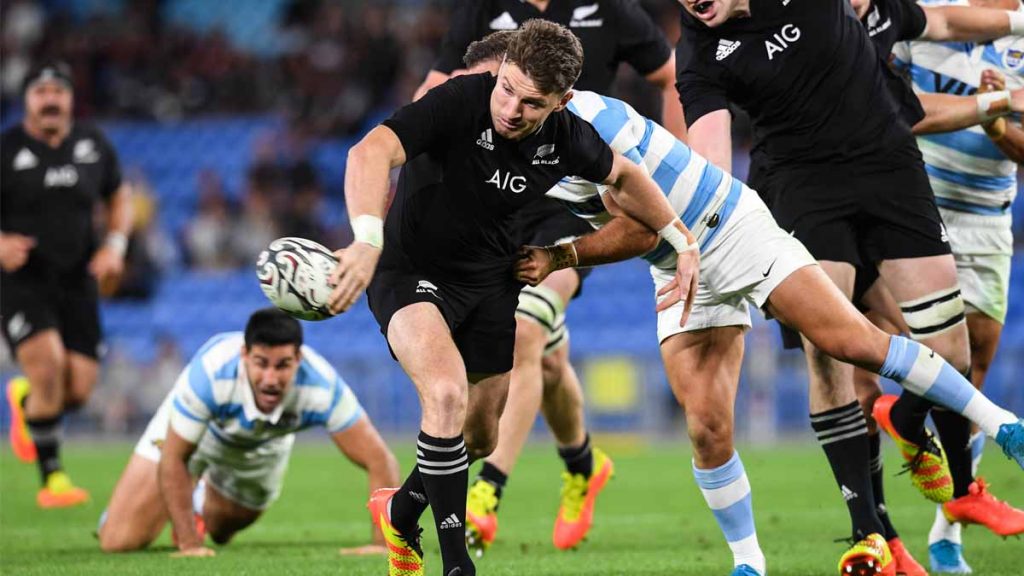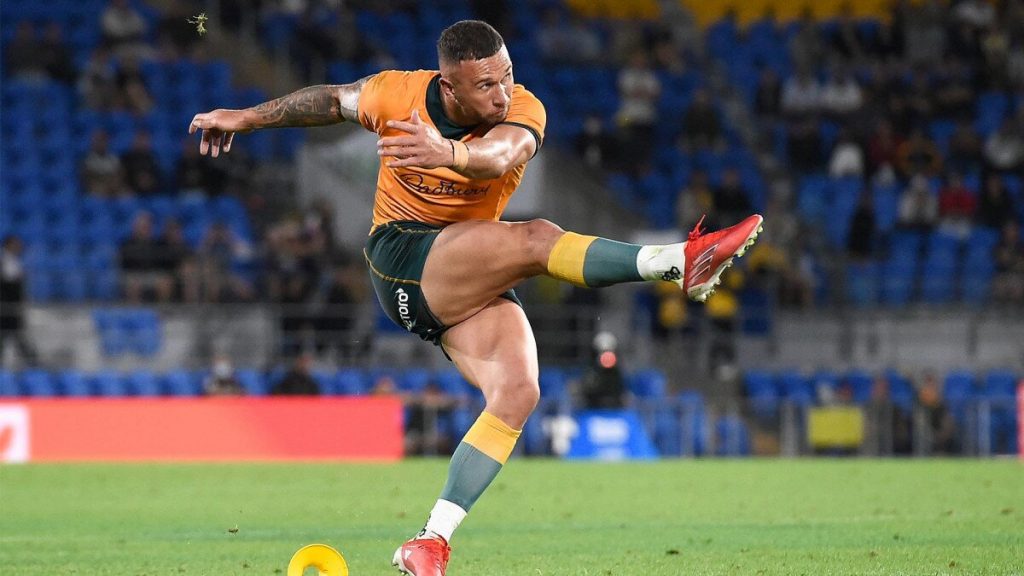Beauden Barrett’s brilliant arcing run and instinctive one-handed pass to Luke Jacobson during the All Blacks’ Rugby Championship victory over Argentina was a highlight package in itself but it also served to underline the extent to which his team were on a different level to the Pumas with regards to both ambition and execution.
It also hinted at a broader picture and something that was perhaps reinforced by the Wallabies’ dramatic two-point victory over the world champion Springboks that followed yesterday: after four years of defence being in the ascendency, is the game evolving again to reward teams with attacking ambition?
It’s dangerous to draw too many conclusions after a handful of tests this year, but there were glimpses during the two back-to-back tests on the Gold Coast that a changing of the guard may be coming.
The All Blacks broke down the Argentines by forcing them to make tackles. A lot of tackles. The Pumas made 206 from 237 attempts, the All Blacks had a much lighter defensive workload: 107/118.
Mario Ledesma’s men showed during their incredible upset victory over the All Blacks in Australia last year that they are capable of defending brilliantly for sustained periods but the difference yesterday was how the All Blacks forced their opponents to work much harder via the variety of their attack.

Last year the All Blacks ran into too many proverbial blue-and-white brick walls or cul-de-sacs. During Sunday’s 39-0 victory the All Blacks constantly had the Pumas guessing due to their passing game and what was especially noticeable was how the All Blacks’ forwards passed and offloaded so effectively, including prop Karl Tu’inukuafe, hooker Asafo Aumua and locks Brodie Retallick and Scott Barrett.
That the latter pair displayed such skill should surprise no one – they’ve been doing it for years – but for front-rowers to show similar micro skills: the knowledge of when to pass both pre- and post-contact, and the execution to pull it off, appeared to be something approaching a breakthrough.
The intuition and understanding on attack between the All Blacks forwards and backs, despite the changed nature of the team and various absences, including Ardie Savea, Codie Taylor, Sam Whitelock and Aaron Smith, was also noticeable and it’s not a stretch to suggest it’s on a different level to any other nation.
Both teams kicked the ball out of hand 24 times, but the All Blacks passed the ball 243 times – the Pumas only 115. If we take out the passes from halfback TJ Perenara (99) and first-five Barrett (30), the rest were spread relatively evenly between forwards and backs. The All Blacks’ starting pack made 37 passes, the Pumas’ only 18. Offloads, a key to putting players in space, told another story: the Pumas made only one via first-five Nicolas Sanchez, the All Blacks made eight.
This, combined with a near watertight defence, and an ambition to play the game at pace, left the Pumas forwards gasping for air. Pablo Matera and Carlos Muzzio were sin-binned for consistent breakdown offences, with Matera perhaps lucky not to be shown a second yellow card late in the game after committing another right under the referee’s nose, and there was an air of frustration from coach Foster immediately afterwards that the Pumas slowed the game down to the extent they did.
Their kicking game and maul defence, in particular, will be extremely important but they showed against the Pumas that they have the ambition and skills to create space via their hands in order to play to another great strength: their running game and overall fitness.
The All Blacks’ passing game was a key to their attacking success but it wouldn’t have been enough in itself had their set-piece, mauling game, and defence also not held up. They won’t be able to pass themselves out of trouble against the Springboks in a few weeks.
Their kicking game and maul defence, in particular, will be extremely important but they showed against the Pumas that they have the ambition and skills to create space via their hands in order to play to another great strength: their running game and overall fitness.
Their running metres against the Pumas showed the gulf in class when the All Blacks are in this mood: 786m compared with 204m. Fullback Juan Malia was the Pumas’ best runner with the ball with 31m. That was eclipsed by every All Blacks back apart from Perenara (Rieko Ioane was best with 131m), with several forwards beating or equalling him too, including No 8 Jacobson, lock Barrett, hooker Aumua and flanker Akira Ioane.
It was a different story in the second game of the evening, however.
How did the Wallabies beat the Springboks 28-26 despite scoring only one try to their opponents’ three? Quade Cooper’s 100 per cent goalkicking (eight from eight) was a huge factor, including his clutch last-minute penalty on a night in which Boks No 10 Handre Pollard was strangely off-key with his boot (50 per cent).

The Wallabies’ defence – 70 tackles from 79 attempts (94 per cent) – was also very good, and like the All Blacks, they made their opponents tackle far more than they did (120/141, 85 per cent).
They also passed the ball far more than the Boks, who have set themselves up as a set-piece oriented team who kick to put their opponents under pressure. The Wallabies sought space by passing the ball 129 times, the Boks passing only 54 times.
The world champions, who won their series against the British and Irish Lions before beating the Pumas 2-0 in their Rugby Championship fixtures in South Africa, looked rusty with some players, including loose forward Duane Vermuelen, appearing short of a gallop.
They showed in scoring their three tries from lineout drives that this part of their game remains highly dangerous but should an opponent defuse it then they don’t appear to have a Plan B. Their scrum was also put under pressure at key times, including right at the end before replacement Nic White won a key penalty to set up Cooper’s moment of supreme destiny after four years in the wilderness.
The Wallabies’ attack needs work yet; they bombed a late try when Michael Hooper failed to draw and pass well enough to take out a final defender in the final five minutes and the decision by Reece Hodge to kick the ball away near his halfway line as the match reached its denouement almost defied belief.
Has the game changed? Perhaps, perhaps not. If it has or is about to it won’t come as a surprise to former All Blacks coach Steve Hansen, who predicted at the last World Cup that it’s only a matter of time.
But, with blindside flanker Lachie Swinton adding a defensive edge, and Cooper back in charge at No 10, they played with far more variety on attack; certainly, they had far more ambition in this area and that was probably the key.
The question is whether the Pumas and Boks will alter their games as a result or whether they will double down because playing with more ambition without the requisite execution can backfire badly.
The Lions left South Africa ruing their defensive mindset after a tour mired by dull, stop-start rugby and the Boks may have similar thoughts now they’re in Australia. The Wallabies didn’t look after the ball particularly well, and the home side gave up 17 penalties to the Boks’ 11. If they tighten these areas up and beat the Boks again in Brisbane, the world champs may face something approaching a crisis of confidence ahead of their two highly-anticipated tests against the All Blacks.
Has the game changed? Perhaps, perhaps not. If it has or is about to it won’t come as a surprise to former All Blacks coach Steve Hansen, who predicted at the last World Cup that it’s only a matter of time.
“I think there’s a bias towards the defence, that’s definitely happened…” he said. “But someone’s going to crack that defensive nut, because history tells us it will happen. And when it does, then it will open up the floodgates for the attacking game to come strong again. Then everyone will be saying there’s a bias towards attacking, and they’ll go away and work harder on what they’re going to do on defence.”


Comments
Join free and tell us what you really think!
Sign up for free